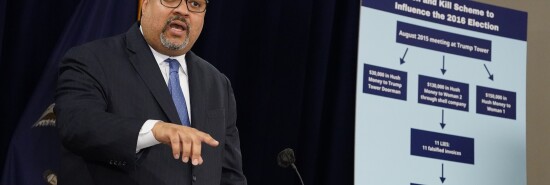
Donald Trump arrest: Too much, too little, too late
Quin Hillyer
Video Embed
Donald Trump is almost assuredly guilty of doing the things of which today’s indictment accuses him, but he and the public still are getting a raw deal on both ends.
The problem, in two ways, is that the timing is all wrong.
DONALD TRUMP ARREST: HOW STRONG IS BRAGG’S CASE AGAINST HIM?
On the front end, Manhattan District Attorney Alvin Bragg has not adequately explained his theory on why the five-year statute of limitations hasn’t expired on the charges against Trump. Even by Bragg’s own account, the alleged crimes ended in 2017, so the end date for indictments should have expired when 2022 waved goodbye. Yes, during the pandemic, then-Gov. Andrew Cuomo issued an executive order that “tolled” (meaning “paused”) the statute of limitations on court cases, but it is far from clear that the tolling period, which ended long ago, can be applied to this case.
This is not the place for a detailed legal analysis of tolling. But as Bragg himself didn’t even enter office until the original tolling period ended, it is ludicrous logically (even if not legally) to say that his investigation of Trump was somehow hindered by the pandemic in a way meriting extra time to concoct an indictment such as this one. (There’s a second tolling argument involving Trump’s residence outside the state, but even more dubious.)
On the back end, Trump and the public are victims of what, by ordinary understanding, would be a violation of the Sixth Amendment right to a speedy trial. The judge set the next public hearing on the case for December 4, a full eight months from now. If one didn’t know how routinely New York dawdles on criminal trials, this would seem like an absurd delay. It means the trial itself probably won’t even begin until well into the campaign season, leaving both the voters and Trump (who may actually desire such a circus) uncertain about whether his candidacy will be that of a soon-to-be-convicted felon.
In context, this isn’t unusual. Reuters reports that “in the first three quarters of 2022, the average criminal case in Manhattan took more than 900 days to move from indictment to a trial verdict.” Do the arithmetic: That’s more than 2.5 years. In other words, New York routinely stretches trials well beyond the usual understanding of “speedy.” Still, if even the first hearing regarding a forthcoming trial of a former president of the United States, for a series of business-record shenanigans that ordinarily are treated as misdemeanors can’t be held sooner than eight months, the system grossly violates at least the spirit of the Sixth Amendment.
CLICK HERE TO READ MORE FROM THE WASHINGTON EXAMINER
This is a 34-count indictment for a series of minor, nearly victimless crimes, which Trump certainly appears to have committed with deliberate intent to deceive, but which prosecutors took too long to charge him with and for which the judge will take too long to try him for. Even for some of us who think Trump is (in the vernacular) crooked as hell, this particular prosecutorial effort seems to push the outermost bounds of propriety.
Trump deserves no sympathy here, but we, the people, surely do deserve sympathy for having such an untimely mess foisted upon us.
